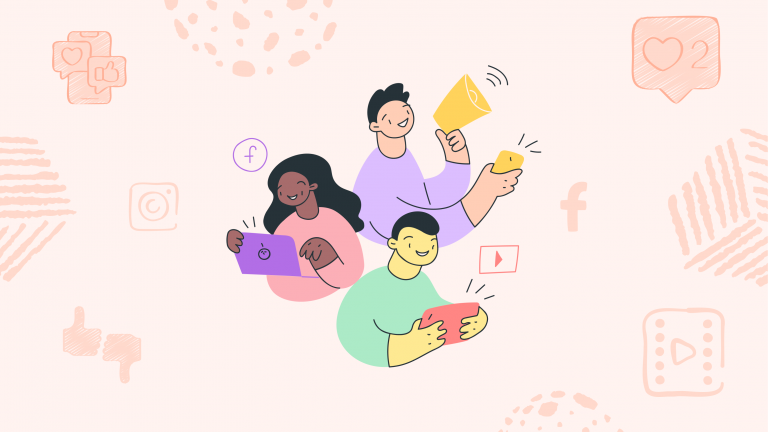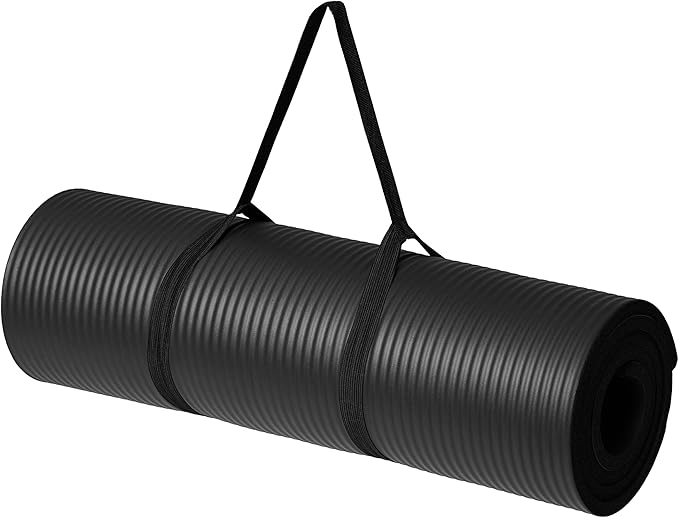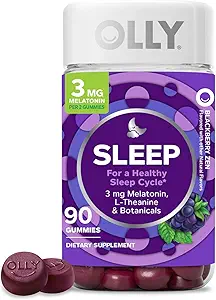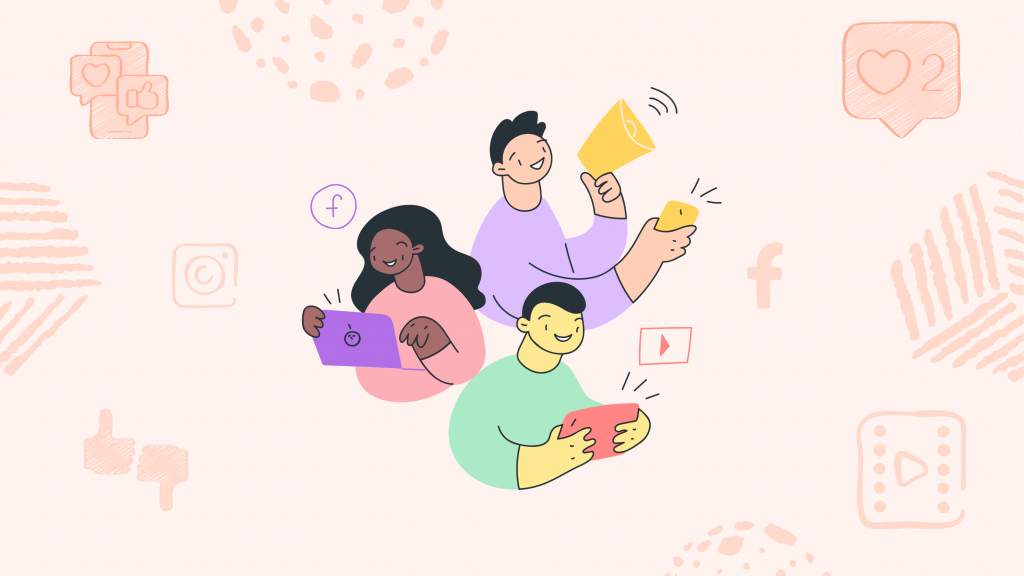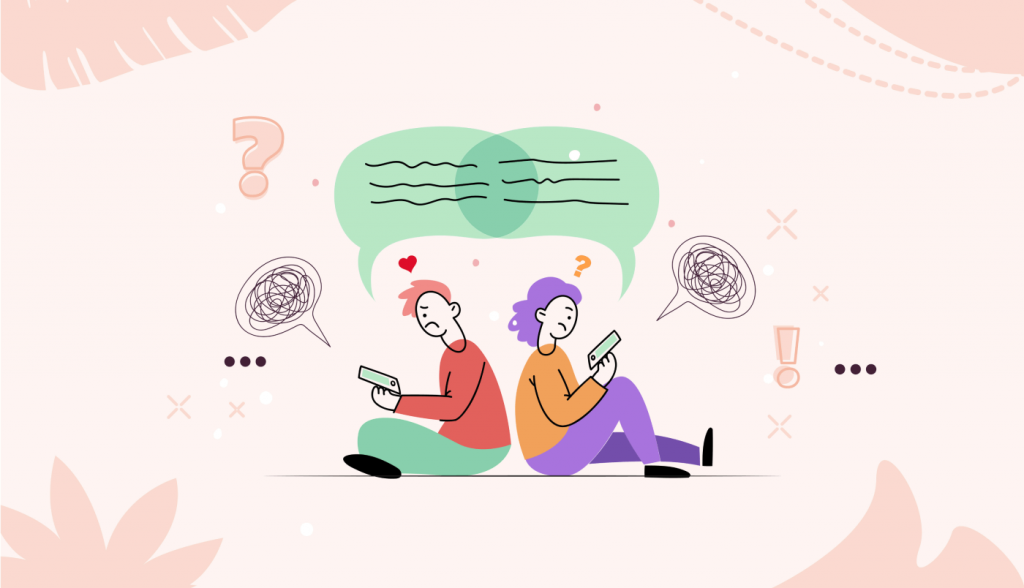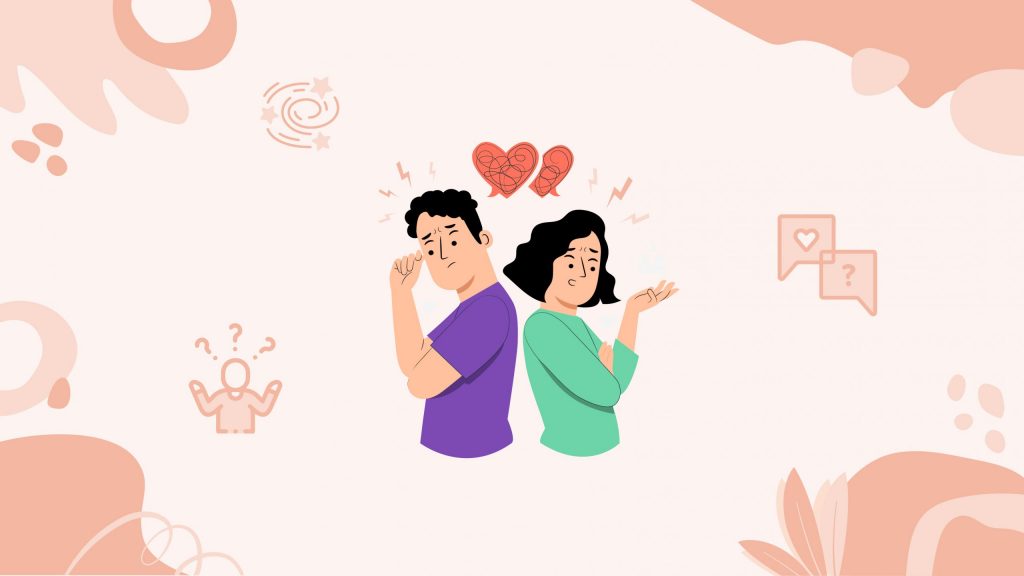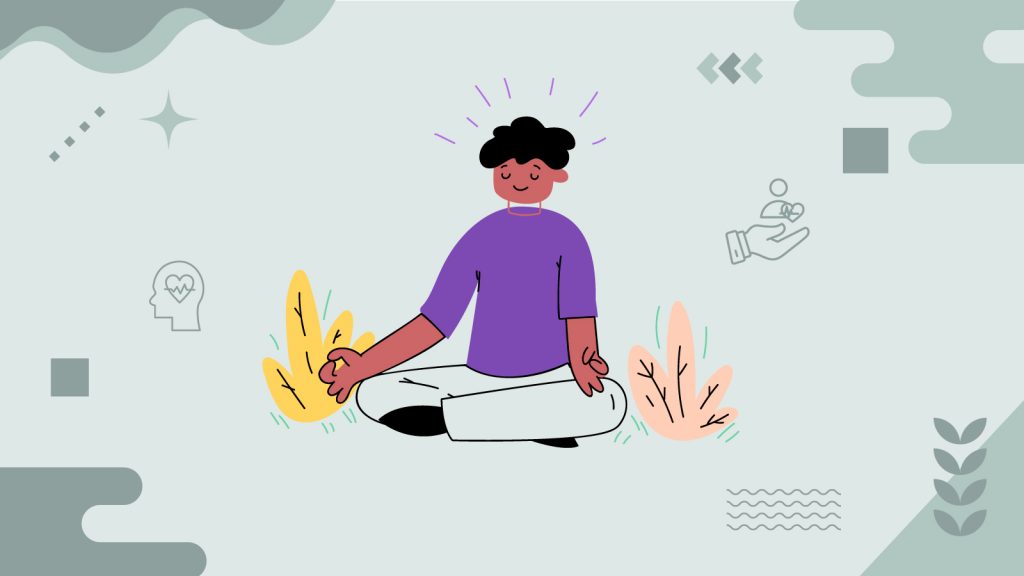Have you ever noticed yourself gazing at your smartphone’s screen to the point where your eyes start hurting? Or worse, you feel like putting down your cell phone, but the urge to scroll through the reels and other content doesn’t allow you to.
Well, if the answer is yes, you need to take quick action.
Why? Because you are facing the serious impact of digital overload.
Digital overload is when we are inundated with information coming from various digital platforms, be it an email notification, social media feeds, news feeds, or other forms of digital content.
In such a scenario, it becomes difficult for our minds to keep up with the incoming information. And then, when it gets flooded with the influx of information, it further struggles to process it and lands into anxiety.
When this happens, it hampers our mind’s ability to function at its optimal capacity. Additionally, it acts as a huge distraction, causing us to disconnect from real-life elements. When we say real-life elements, we mean our day-to-day interactions with the people in our circle, the ability to engage in the hobbies that interest us, our readiness to connect with nature, the time we invest in pursuing physical activities, and so forth.
Keeping in mind the extreme influence of digital overload, it becomes all the more important for us to carry out a digital detox.
What Is a Digital Detox?
Digital detox is when you refrain from consuming content from any digital device (a smartphone, tablet, television, or laptop) for a certain period. Or, say, reduce it to a point where it does not affect your life adversely.
A digital detox typically involves mindful use of digital devices, where we mindfully consume digital content instead of being distracted by the beeps of notifications and the stream of information that flows through our smartphones and other digital devices.
If you are wondering why it is needed in the first place, here’s a detailed analysis of what happens when we get into the temptation of surfing digital content without realizing how it engulfs us.
Know If You Need a Digital Detox or Not
Now that we know what a digital detox is, the next step is to find out how deep we are standing in these waters. Remaining digitally active is a dire need in this era. We cannot disconnect ourselves from the digital world while still wanting to become successful in our professional endeavors or otherwise.
This is where it becomes important to analyze whether we, too, seriously need to consider digital detox or not.
So, here’s a quick self-assessment test to find your level of involvement in the digital world:
- Are you suffering from any lifestyle disease? Yes/No
- Do you struggle to fall asleep? Yes/No
- Are you able to keep your hands off your phone during meals and conversations? Yes/No
- Do you feel anxious when you are not able to use your digital devices? Yes/No
- Do you often feel the urge to check the notifications or messages every minute, even when there are none? Yes/No
- Do you feel your work productivity is hampered due to the overuse of digital devices? Yes/No
- Do you feel you have quit indulging in your hobbies and invested your maximum time browsing through your smartphones? Yes/No
- Are you someone who prefers online conversations over in-person meetings? Yes/No
- Are you among those who have a hard time relating to topics like mindfulness and awareness? Yes/No
If you’ve got 4 ‘Yes’ or more, you need to scroll down to study the impact of Digital Detox. There’s a strong possibility you’re deep in the mud and need effective solutions to minimize the impact of digital overload.
Reasons to Consider a Digital Detox
#1: Physical and Mental Wellbeing
We do not realize how continuous indulgence in phones, laptops, and televisions affects our physical and mental health. When we prolong the use of digital devices, it causes health issues like eye strain, poor posture, and disrupted sleep patterns.
According to the American Psychological Association, 86% of adults in the U.S. check their emails and social media accounts constantly, contributing to heightened stress levels.
We passively slip into a sedentary lifestyle, which becomes the cause of further distress, anxiety, and many lifestyle diseases that affect our overall well-being. It’s one of the prominent reasons why individuals get stuck in the trap of conditions like obesity, cardiovascular diseases, and musculoskeletal problems.
#2: Sleep Quality
The other prominent reason to consider a digital detox is our affected sleep quality. We may not realize it, but when we overindulge in digital devices—consuming digital content incessantly, it affects our sleep quality—making us feel more anxious and restless.
Studies have shown that scrolling through the phone can seriously interfere with our sleep patterns. While we find it most tempting to watch the reels and video content before slipping into our slumber, it is the worst thing we can do to disrupt our sleep quality.
Scientists have also reported that the blue light that emits from our smartphones interferes with the production of melatonin—a hormone responsible for our sleep. Also, it is suggested by several studies that excessive screen time increases our cortisol levels, leading to increased stress and anxiety.
#3: Productivity
When we invest most of our time in scrolling through digital content, it tricks us into believing we are productive and adding value to our time. However, the reality couldn’t be any farther from this. We end up surfing from page to page and website to website, thinking that we are gaining knowledge from it. This is where mindfulness assists us in ways where we are able to think through clearly.
In addition to this, the persistent beeps and notifications become a cause of great distraction, which affects our work productivity. Even if we are determined to invest time and focus on a particular task at work, it becomes a challenge to resist the temptation of checking the notifications. When we are the passive receivers of the information that comes from all sides of the internet, it further affects our creativity.
Our brain requires time to process the information, and when we continuously load the information, we deprive our brains of the opportunity to generate new ideas and work along those lines.
#4: Quality of Relationships
When we plug into our digital devices, we inherently pay complete attention to the content we view on our screens. This is where we lack in giving personal attention to our loved ones who long for our attention.
Let’s try to understand it with the help of a small exercise.
Get yourself into a hypothetical situation where you are to meet two complete strangers but are not allowed to talk.
The first one entered with a cell phone in his hand. He took a seat, checked his notifications before sharing a glance, and then placed his cell phone on the table.
The second one comes in, sits beside you, slips the phone into his pocket, and then attempts to engage you in a deep gaze.
Whom do you think would give you the impression of being more interested in you, making you feel that you matter? The mere action of keeping the phone away from sight is making a difference.
This is where we can understand how digital overload messes with our relationships beyond our conscious knowing and understanding.
How to Do a Digital Detox
When you step into the challenge of leading an analog life, it is important that you first catch yourself in this situation and realize that you are a dire victim of digital overload. Once you realize this, you can always take the charge in your hands to get back to where you want to be.
Here are the ways in which you can start towards digital detox
#1: Set Boundaries:
To achieve successful execution, you must start by setting boundaries, which essentially means restricting your screen time. You can do this in various ways, such as designating digital-free zones, digital-free hours, or even making rituals that, at certain timings or events, won’t entertain the screens, no matter how urgent they seem. It could be:
- Not scrolling your phones during meal times.
- Keeping an hour reserved for prayers (or meditation ) before sleeping and after waking up.
- Not attending the phones or scrolling through your screens while you are conversing with your friends, family, and other close connections.
- Keeping an hour reserved as a touch-free hour to deepen your practice of staying without your phone or other digital devices.
- Restricting the use of mobiles in the office to wade off the distractions.
#2: Remove Distractions
Once you work towards setting concrete limits, it is equally important to limit the distractions from your smart devices. For this, the first step is to adjust the phone settings so you get the least number of notifications and, hence, less disturbance. If you like to take a step further, you can even delete your social media apps, which are the main culprits that hook you to your mobile phones.
Nowadays, smartphones come with pre-installed features that allow you to get a detailed analysis of the apps. Keeping a close tab on the usage of apps and monitoring it from time to time is an excellent way of successfully rediverting the distractions that are hampering your actual growth and productivity.
#3: Practice Mindfulness
Practicing mindfulness is about being completely present wherever you are and whatever you do, whether it’s eating, dancing, exercising, walking, or any other activity. The greatest benefit of practicing mindfulness is that we get into the depth of the moment with our thoughts and feelings, and it helps us find the right balance.
When we become mindful of everything we do, we are lining ourselves for the best possible results. Similar is the case with digital detox. When we become mindful of the apps that we use and the content we surf, we cut down on unnecessary scrolling and save ourselves time and energy that otherwise go unaccountable.
#4: Cultivate Hobbies
By cultivating new hobbies, you are creating room for yourself to invest time in activities you are interested in rather than on digital devices. These hobbies could relate to any field, such as painting, reading, gardening, dancing, exercising, etc. The idea is to maintain a sync with real life and not get lost in virtual life, where we get disillusioned and lose touch with ourselves. Also, it will sharpen your mindfulness on its own.
Keeping yourself engaged in activities other than screen time would bring you joy and fulfillment, which is a meditative exercise in itself.
#5: Include Others
Seeking the support of your friends and family is an excellent way to work through this transition. Include them in your mission to limit your screen time. When they point you out occasions when you are overusing your smartphone or deviating from your digital detox drive, they give you instant reminders, helping you effectively cut down on your digital content consumption.
When you include other people in your mission to reduce the time spent on digital devices, it will not only help you stay consistent in your goal but also encourage you to discover a balanced and fulfilling lifestyle.
👉 Pro Tip:
Join digital detox groups and communities to effectively implement the steps to reduce your indulgence in digital devices.
#6: Indulge in Physical Activities
When we choose to engage in various physical activities, we are automatically putting our minds in a healthy frame.
Ever noticed how refreshed and energized you feel after your gym session (or yoga if you are a yoga person)? Try it for yourself, and see how transformed you’ll be after a single yoga session.
This is the upside of remaining physically active. It will keep you in the default state of being mindful while keeping your stress levels in check.
#7: Honor the Milestones
By this, we mean acknowledging your progress, no matter how small it is. If you achieve a digital milestone, make sure you recognize it so it can become a stimulus to reach greater targets. Whether by rewarding yourself or using it as positive reinforcement, you must acknowledge the progress made so that you can make sure it doesn’t go unnoticed.
It will help you in two ways. First, it will keep you motivated and help you remain consistent in the goal. Second, it will help you establish a positive relationship with yourself, where you naturally engage in positive self-talk.
Benefits of a Digital Detox
#1: Improved Physical and Mental Health
Among the primary benefits of digital detox is improved physical and mental health. When we align ourselves with healthy living and limit our content consumption from various digital mediums, we sign up for a healthy body and a sound mind.
#2: Improved Sleep Quality
As discussed above, a digital detox is the most effective way to improve sleep quality. By eliminating the factors (like limiting our watch time on digital devices) that interfere with our mind and body chemistry, we ensure that we are having a good night’s sleep and a refreshed morning thereafter. You can also give sleep gummies a try for improved and restful sleep.
#3: Increased Productivity
Follow the simple science, and you will know how digital detox contributes to almost every area of your life. When you do a ‘digital fast,’ it will help you reduce your stress levels, which will ultimately benefit you both on your personal and professional front—allowing you to perform at your optimal level.
#4: Strengthen Relationships
We generally put our friends and family on hold while remaining engaged in our smartphones, which is exactly the opposite of what we should do. Digital detox is what gets us back on the right track and allows us to nurture our relationships the way they deserve.
#5: Environmental Awareness
When we remain open to our surroundings and put a conscious effort into staying aware, we genuinely align ourselves with the right practice. You can get into its practice by spending time outdoors or listening to nature sounds to get attuned to the present moment.
#6: Re-Evaluating Priorities
Once we unplug from the digital world, we enter into the mind space where we can re-evaluate our priorities and then aspire to live according to them.
When we remain slaves to our smartphones, we may never reach the realization of how we are losing our time and energy in viewing content that is not even relevant. This is where digital detox helps us come back to our sanity and allow us to take back our charge.
Tips for a Successful Digital Detox
#1: Set Clear Goals
Get started with setting clear goals. With clear goals, you first need to identify the problem areas and then work towards resolving them. For instance, you receive consistent feedback about not paying attention to your peers while in conversation. In such a case, you can start by putting off your phone before initiating a conversation with your friends.
#2: Start Small
Starting small is the key if you want to accomplish your goals effectively. Make sure you are setting small targets, and once you start achieving those, you’ll be motivated to move ahead in your digital detox regime and make actual progress. Reducing your screen time and usage of apps can be overwhelming, so start small, and it will work wonders.
#3: Track your Phone Usage
We slip into destructive digital behavior when we lose track of the time invested in it. Instead, do the opposite and start tracking your phone. It will not only help you maintain digital wellness but also leave you ample time for offline activities. Seek technology assistance for the same, and you are good to go.
#4: Stay Committed to your Goal
Staying committed to your goal is the ultimate hack to channel your energy. You can start by installing apps like Moment, Forest, and Offline that help you track your screen time, limit your phone usage time, or provide access to limited apps so that you can curb the behavior of using your smartphones obsessively.
#5: Practice Mindfulness
Practicing mindfulness is about investing your thoughts, feelings, and emotions in whatever you do. It could be a task as simple as eating your daily meals. When you ensure you are fully present in the moment, you have no choice but to take the right action and do the right thing, bringing yourself to complete calm and ease.
Conclusion
By intentionally stepping away from digital devices and immersing yourself in offline activities, you will do yourself a great favor. Understanding the importance and urgency of following a digital detox is crucial for your overall growth. Implementing simple steps will make a significant difference, and once you start noticing your progress along the digital detox journey, there will be no looking back.
Prepare yourself to transform into a completely different person and see how productive and responsible you will become through this straightforward exercise of limiting the use of your digital devices. Embrace the challenge, and watch as your life becomes more balanced, fulfilling, and enriched by the power of a digital detox.
Sources:
- Sage Publication: Digital detox – An effective solution in the smartphone era? A systematic literature review
- Research Gate: Digital Detox Research: An Analysis of Applied Methods and Implications for Future Studies
- T.D.W. Wilcockson, A.M. Osborne, D.A. Ellis, Science Direct: Digital detox: The effect of smartphone abstinence on mood, anxiety, and craving













